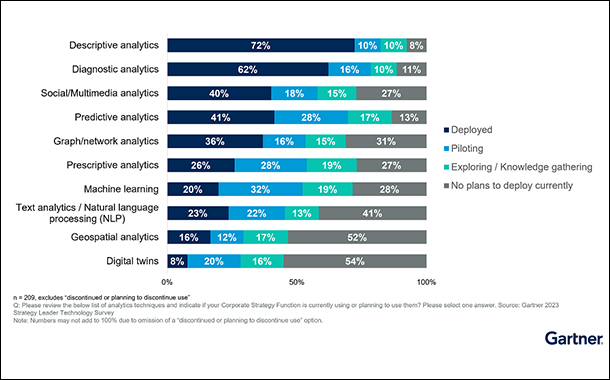79% of corporate strategists said that technologies such as analytics, artificial intelligence and automation will be critical to their success over the next two years, according to a survey by Gartner. Strategists said that, on average, 50% of strategic planning and execution activities could be partially or fully automated; currently only 15% are.
The survey was conducted from October 2022 through April 2023 among 200 corporate strategy leaders in North America, Western Europe, Asia/Pacific, and Australia/New Zealand, across different industries, revenue and company sizes.
“Leveraging analytics and AI for more efficient, insightful strategy decisions is one of the biggest challenges, and opportunities, corporate strategists face this year,” said David Akers, Director, Research at Gartner. “For years, strategists have told their businesses: If you want to stay competitive and effective, you need to go digital. Now, they appear ready to apply that guidance to their own workflows.”
While most corporate strategists said that they are using descriptive and diagnostic analytics, less than half said they are using more advanced tools such as predictive, prescriptive or graph analytics (see Figure 1). Similarly, only 20% of strategists reported using AI-related tools, such as machine learning or natural language processing, for their function. However, a large percentage of strategy leaders said they are either piloting these tools or exploring use options. For example, 51% said they are investigating machine learning and 45% said the same for predictive analytics.
Figure 1: Corporate Strategists’ Use of Analytics (Percentage of Respondents)

Build a Use Case Strategy
One of the biggest obstacles to implementation is establishing a clear use case for new technologies. Fifty-two percent of strategists report that this is a top-three challenge — the most selected response.
“There are several reasons for this,” said Akers. “Strategists face an unfamiliar vendor market, have too many options to choose from and have little precedent to build upon.”
Much of the advanced technology that strategists said they are aiming to implement is already being used successfully elsewhere. To build a strong business case, Gartner recommends first mapping existing functionality to specific needs, then consider how to prioritize the different use cases that advanced technology could offer by asking questions about the purpose, impact and suitability of the new tools.
Gartner clients can read more in the report “Strategists Say New Technologies Are Critical to Function’s Success.”
Additional leadership trends will be presented during Gartner IT Symposium/Xpo, the world’s most important conferences for CIOs and other IT executives. Gartner analysts and attendees will explore the technology, insights and trends shaping the future of IT and business, including accelerating business transformation, cybersecurity, AI, customer experience, data analytics, executive leadership and more. Follow news and updates from the conferences on Twitter using #GartnerSYM.
Upcoming dates and locations for Gartner IT Symposium/Xpo include:
September 11-13 | Gold Coast, Australia
October 16-19 | Orlando, FL
November 6-9 | Barcelona, Spain
November 13-15 | Tokyo, Japan
November 28-30 | Kochi, India





















